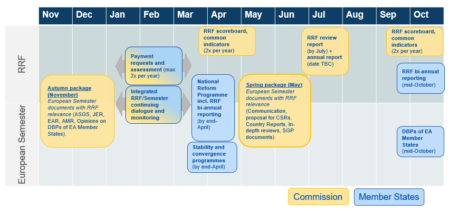Our work on the European Semester
What is the European Semester?
The European Semester is the main tool at European level to monitor national progress on economic and fiscal policies. Born as a macroeconomic tool within the Europe 2020 strategy, it has become also the tool through which the Commission also makes recommendations for social policy reforms at national level. It is part of the European Union’s economic governance framework which aims to detect, prevent and correct problematic economic trends such as excessive government deficits or public debt levels. Its focus is on the 6-month period from the beginning of each year, hence its named the ‘semester’.

Source: European Commission
During the European Semester Member States are supposed to align their budgetary and economic policies with the objectives and rules agreed at the EU level. The European Semester starts with the publication of the Annual Growth Survey (AGS). The AGS sets out the broader EU objectives for the year to come, with a focus on the economy. Members States produce National Reform Programmes (NRPs) addressing how they implement reform, that are then analysed by the European Commission and the European Council. The European Council replies to the Member States with Country Specific Recommendations (CSRs) as an assessment of their efforts to achieve the EU objectives addressed to their countries.
Following the Covid-19 pandemic and the introduction of the Recovery and Resilience Facility (RRF) to support the economic recovery of Member States, the European Semester has adapted its policy coordination to the RRF’s implementation requirements, thus integrating the National Recovery and Resilience Plans and keeping track of their progress as well.
The European Pillar of Social Rights and its Action Plan
The European Pillar of Social Rights (EPSR) was launched in November 2017 and sets out 20 key principles to create a strong social Europe that is fair, sustainable and inclusive for all. An Action Plan was developed by the Commission to provide concrete steps and actions that the EU and its Member States have to take in terms of policies and reforms to fully implement the EPSR. The Action Plan also sets three EU-level targets to be achieved by 2030 in the area of employment, skills and poverty reduction. The EPSR has become even more relevant since the Porto Declaration adopted in May 2021 by members of the European Council during the Social Summit, which gave new momentum to its implementation. The EPSR represents now the main framework for all EU programmes and initiatives, including the European Semester. In the 2022 European Semester, for instance, the country reports include an assessment of the progress made by each Member State on the implementation of the EPSR.
Our work in relation to the European Semester:
Annual Growth Survey (AGS)
Short analytical analysis of the AGS 2019 For a stronger Europe in the face of global uncertainty.
Short analytical analysis of the AGS 2018 What priorities does the Commission highlight that impact rehabilitation services? December 2017
Letter in response to AGS 2016 – EPR joint work with Social Services Europe – Highlighting the importance of social investment – EPR joint work with Social Services Europe – February 2016
Letter to the European Commission making recommendations to the 2016 AGS – EPR joint work with Social Services Europe – October 2015
Analysis of National Reform Programmes (NRPs)
Analysis of Country Specific Recommendations (CSRs)
Our Information Note on the CSRs 2019 highlights key recommendations on employment, education and training and their relevance for our members.
Our short analysis on the CSRs 2017 focuses on the main recommendations given by the European Commission to national governments on Social protection, Education, Training and Employment.
CSRs – What opportunities for VET, health and social service providers? – June 2016
Overview CSRs Employment – 2015
Analytical papers
Training Seminars
Online training on the impact of the European Semester and the UNCRPD on the right to work of people with disabilities – 4 November 2015
Training Seminar on European Semester mechanism – 27 March 2015
European and National Consultations
EPR contribution to the Public Consultation on the Europe 2020 Strategy



 This website received support from the EPR framework partnership agreement with the European Commission, DG Employment, Social Affairs and Inclusion for 2018-2022 from the EU Programme for Employment and Social Innovation (EaSI). For further information please consult:
This website received support from the EPR framework partnership agreement with the European Commission, DG Employment, Social Affairs and Inclusion for 2018-2022 from the EU Programme for Employment and Social Innovation (EaSI). For further information please consult: